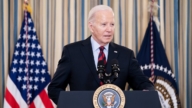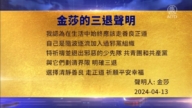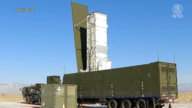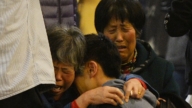【新唐人2014年04月18日訊】美國國防部長查克•哈格爾日前訪華,一方面加強與中國的對話,另一方面又強化美國在亞太地區的軍事同盟關係。中共中央軍委主席習近平,9號在北京會見哈格爾時表示,中美「雙方應該堅持不衝突、不對抗、相互尊重、合作共贏的原則」進行合作。不過最近有消息強調,中共全方位的軍費開銷和強硬的地區行動,正讓鄰國不安。
數年來,中國的軍費以兩位數的速度增長。中共當局3月公布的2014年國防預算,約1310億美元,是日本的兩倍多,在國際上僅次於美國。
中共除了積極開展軍事現代化設備,展現肌力之外,美國「新安全戰略中心(CNAS)」3月發佈的報告說,中共還在制定「定制脅迫」戰略。
美國《防務新聞》週刊網站,4月14號也發表了《中國全面軍事現代化和定制脅迫》文章。報導引述美國「AMI國際諮詢公司」託尼•貝廷格的話說,中國海軍現代化已經走過20多年,發展出了遠洋艦隊,支持中國向第一和第二島鏈,投射武力的戰略,和長期控制這些水域的政策。
他說:「中國海軍和準海上部隊(包括海警及其他海上安全船只「愛國漁船」),現在展現出他們在南海和東海執行這種戰略的自信,這體現在中國與菲律賓在南沙群島、以及中國(中共)與日本在釣魚島問題上,咄咄逼人的行為。」
台灣「政治大學國際事務學院」教授丁樹範﹕「我是覺得中、日在釣魚島上不會有一戰,彼此只是用這種升高的民族主義,或這種情緒來作為內部政治動員的一個工具。就是說,把這種升高的緊張用來解決國內政治(問題)的一種手段。如果中、日發生小規模軍事衝突的話,中國不見得會佔到便宜,可是長期來講的話,日本會不會能夠討到便宜,這變成另一個問題了。」
《新唐人》時事評論員文昭分析,大規模的消耗性長期戰爭,對目前中共來講一點好處都沒有。中共可能製造一些突發性事件來佔點便宜,比方說擊沉天安鑑、砲轟延平島,然後對內宣稱取得了勝利。
《新唐人》時事評論員文昭﹕「因為釣魚島它只是幾個無人的荒島,它孤懸海外,它沒有任何可防守性,如果說中共這一方去奪取島嶼的話,那就實際會帶來中、日兩國海、空、軍力量的一次全面的會戰。有一方遭受決定性的損失之後,才可能在主權問題上產生永久性退讓。這種局部戰爭的成本代價是非常高的,產生的後果是非常複雜深遠的,所以說應該雙方目前都沒有這個打算。」
對於中共當局花費巨額軍費在軍事現代化上的努力,以及「定制脅迫」戰略,美國能做些甚麼?
日前,《美國之音》轉述美國軍方報紙《星條旗報》報導中,美軍高官威斯勒的話說:如果我們受命奪回釣魚島,我們能行?當然可以。但是,我要告訴你們(記者),我們如何奪回,諸如此類的情況是否會發生,這一切,都只是純粹的估計和猜測。
文昭表示,美國並不想和一個擁有核武器的國家,發生正面的軍事衝突。
文昭﹕「所以說本身美、日也沒有開戰的願望,就是進行大規模常規戰爭的願望。中共的心態有一定的投機心態,向北韓那種思維方式靠攏。還有一種情況就是說,本身在釣魚島這個海域,只要中共不登島、奪島的話,大規模的軍事對抗是不太可能發生的,有可能是一兩架飛機、雙方一兩只船只,在一些外圍海域的一些小磨擦,這種危險性是比較大的。」
台灣「臺海安全研析中心」主任梅復興對《自由亞洲電臺》表示,如果中、日發生軍事衝突,中國要嘛與日本打個平手, 要嘛略佔點便宜。而美國不會坐視不管,並且會支持日本。因為一來有《日美安保條約》的規定, 二是美國至少在可預見的未來,沒有打算放棄自己在亞太地區盟主的地位。
梅復興說,如果美國與日本站在一邊,中、日戰爭結果則很難說了。
採訪/陳漢 編輯/周平 後製/李勇
A Sino-Japanese War: Competition or Not?
U.S. Secretary of Defense Chuck Hagel
recently visited China.
He paid attention to the dialogue with China. He also
strengthened the military alliance with the United States,
in the Asia-Pacific region.
The Chinese Communist Party (CCP) Central Military
Commission Chairman Xi Jinping met Hagel on April 9.
He said both sides should adhere to principles such as mutual
respect, no conflict or confrontation, and win-win cooperation.
However, recent news stressed that the military spending and
tough regional action disturbed the neighboring countries.
Over the years, China’s military spending increased with
double-digit growth rate.
The CCP announced the $131 billion defense budget
in March 2014.
This is more than twice the spend compared to Japan, and
second to the United States.
The CCP showed its strength by actively carrying out military
equipment modernization.
According to a report published by Center for a New American
Security (CNAS), the CCP is also developing a “customized
stress" strategy.
The “Defense News" also published an article – “China’s
comprehensive military modernization and customized stress"
on Apr. 14.
The report quoted Tony Bettinger from AMI international
consulting company who said that the Chinese naval
modernization has taken about 20 years.
A fleet of ocean-going vessels were developed to support
forcible attention in the first and second island chain of China.
A long-term control policy in these waters was
developed at the same time.
He said: “The Chinese navy and prospective maritime forces
(including the Coast Guard and other maritime safety vessels)
are showing confidence to perform such a strategy in the South
China Sea and East China Sea.
The confidence was reflected in the aggressive action of
China on the Spratly Islands issues with Philippines and the
Diaoyu Islands issues with Japan."
Will there be a military conflict due to the Diaoyu Islands
sovereignty dispute between China and Japan?
Ding Shufan, professor of the College of International Affairs,
Chengchi University: “I do not think there is a war on over the
Diaoyu Islands.
Both countries used the increased nationalism or sentiments
as a tool for internal political mobilization.
This increased tension was put out as a means to solve
domestic political issues.
If a small-scale military conflict occurred, It might not be to
the best benefit of China.
However, it could become another problem if the Japanese
are able to take the advantage of it in a long term."
Wenzhao, a NTD commentator analyzed that a long-term
and large-scale war brings nothing to the current CCP.
The CCP may create some unexpected events, e.g. sinking
Cheonan and shelling Yeonpyeong island.
Then the CCP could claim victory for the Chinese people.
Wenzhao: “Diaoyu Islands includes only a few uninhabited
desert islands.
The islands are overseas without defenses. If the CCP seized
the island, there would be a battle between China and Japan.
Only after one party suffered a decisive loss, could it create
permanent concessions on the sovereignty issue.
The cost of this local war is very high, and the consequences
are far-reaching and complex.
So, both sides should not have such an intention."
With the huge military spending and the “customized stress"
strategy of the CCP, what can the U.S. do?
Recently, “Voice of America" quoted U.S. military official
Whistler’s words in “Stars and Stripes":
“If we are ordered to retake the Diaoyu Islands, can we do it?
Of course we can.
But I want to tell you, how do we recapture it? Could this
sort of situation happen?
All this is just pure speculation and estimation."
Wenzhao said that the U.S. does not want to start a military
conflict with a country holding nuclear weapons.
Commentator Wenzhao: “There is no desire for war for the
U.S. and Japan.
I mean the large-scale conventional war. The CCP has some
speculative mentality.
The way of thinking is closer to North Korea. The situation
is as long as the CCP does not seize the island, large-scale
military confrontation is unlikely to happen.
There could be small friction in the peripheral waters between
one or two aircrafts or vessels, this risk is relatively high."
Mei Fuxing, the director of Taihai Security Research Center
told Radio Free Asia that, if there was a military conflict
between China and Japan, they could play for a draw, or
China could take some advantage of it.
The U.S. will not sit idly by – it must support Japan.
There is the “Japan-US Security Treaty", and the U.S. did not
intend to give up its position in the Asia-Pacific region at least
for the foreseeable future.
Mei Fuxing said, if the U.S. and Japan stand on the side, it will
be hard to say what the result of the war will be.
Interview/Chen Han Edit/Zhou Ping Post-Production/Li Yong

























